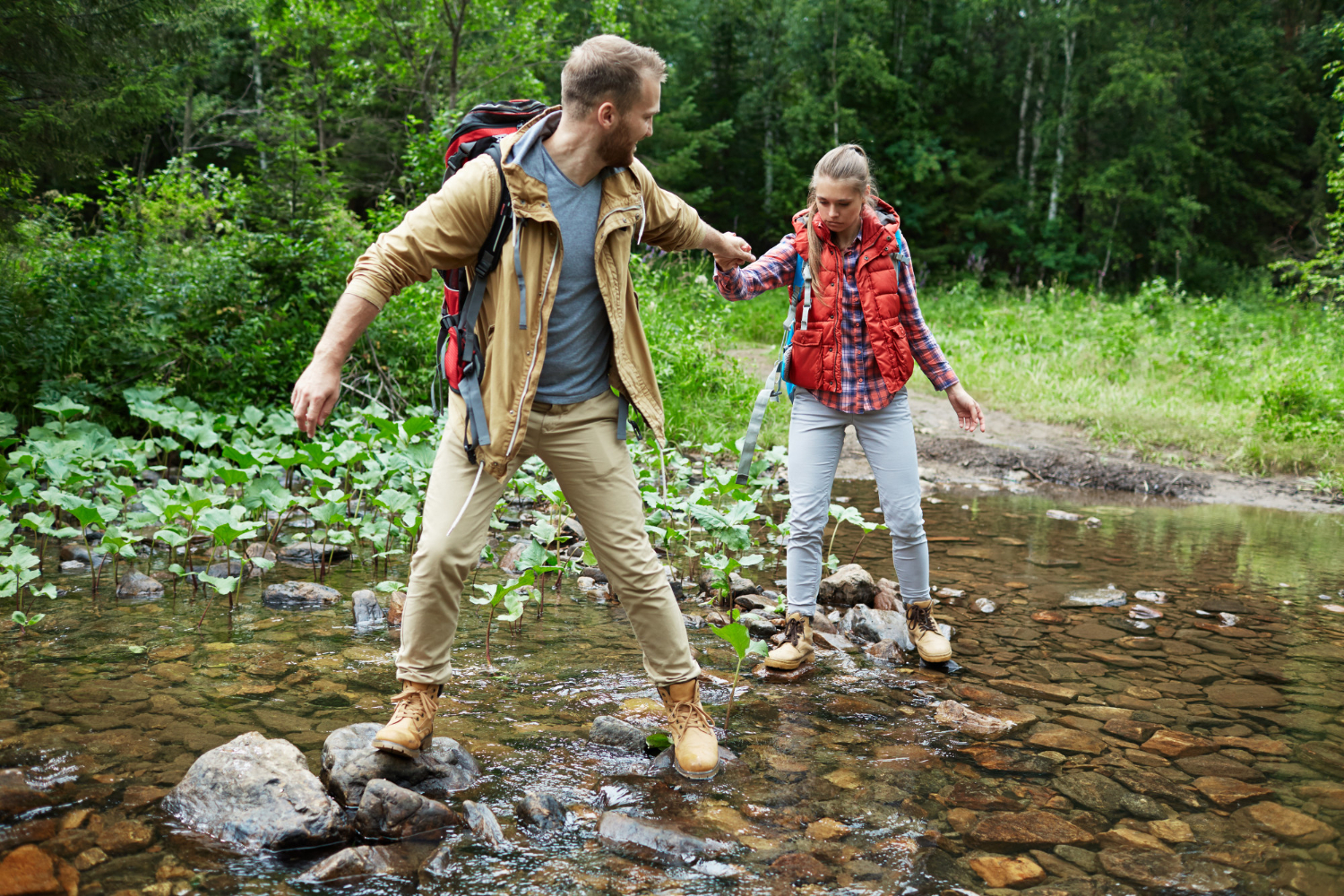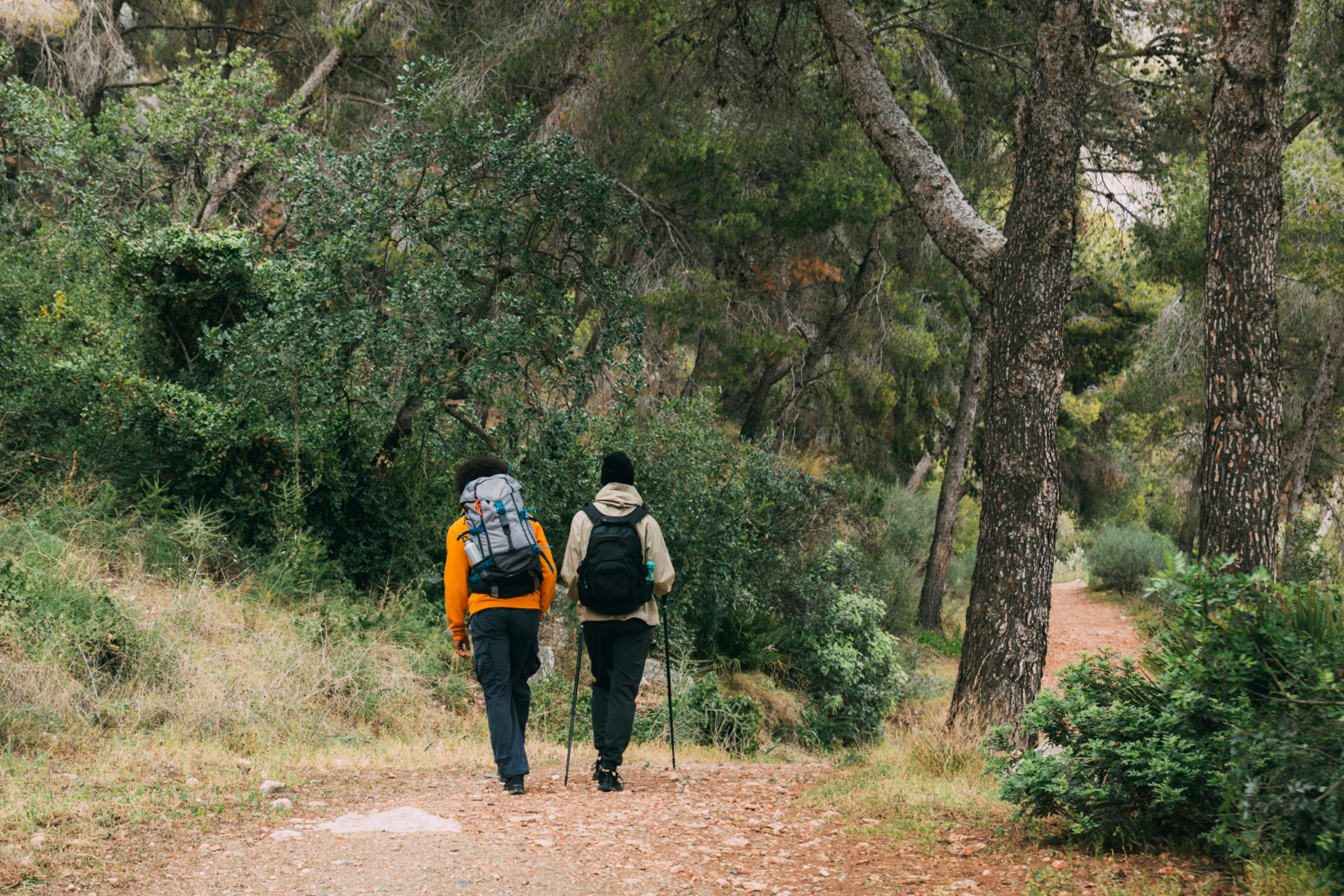Your Ultimate Guide to Hiking in Nashville, TN
Planning your next hiking adventure doesn't have to be overwhelming, especially when you're exploring one of America's most surprising hiking destinations. Nashville, Tennessee, offers far more than just country music and honky-tonks—the city provides access to diverse trail systems that range from peaceful lake walks to challenging ridge climbs, all within minutes of downtown's bustling energy.

Here's what makes Nashville extraordinary for hiking: you're positioned in a city where over 3,100 acres of municipal parkland at Warner Parks combines with pristine natural areas like Radnor Lake State Park to create genuine wilderness experiences within 15 minutes of downtown. Whether you're looking to escape the urban energy on peaceful nature trails, challenge yourself with technical ridge hikes, or discover hidden natural gems that most visitors never experience, this guide will help you explore Nashville's surprisingly diverse hiking landscape.
With access to Percy Warner Park's 12 miles of primitive hiking trails, Radnor Lake State Park's 7.75 miles of diverse terrain from easy lake walks to challenging ridge climbs, and Edwin Warner Park's extensive trail network, Nashville serves as an unexpected hiking destination. The city's location in the Nashville Basin, surrounded by some of the highest hills in the region, creates diverse ecosystems supporting abundant wildlife and providing hiking experiences that rival dedicated wilderness areas.
URBAN OASIS HIKING: Nashville's Natural Sanctuaries

Getting Started: Easy Nature Escapes
If you're new to hiking or seeking accessible nature experiences, Nashville's urban natural areas offer some of the most welcoming and rewarding trail systems in the Southeast. These locations provide genuine wilderness experiences while maintaining easy access, well-maintained trails, and safety margins ideal for families and beginning hikers.
Radnor Lake State Park represents Nashville's crown jewel of urban hiking. This 1,368-acre Class II Natural Area sits just 10 miles from downtown Nashville, offering 7.75 miles of diverse trails strictly dedicated to hiking, photography, and wildlife observation. The park provides hiking experiences from gentle 0.20-mile accessible walks to challenging 1.65-mile ridge climbs.
The Lake Trail offers the perfect introduction at 1.35 miles of easy, ADA-accessible hiking around the north side of 85-acre Radnor Lake. This mulch and gravel surface trail provides excellent vistas of the lake and wildlife through several observation points. The trail showcases why Radnor Lake has some of the highest hills in the Nashville Basin while providing gentle, accessible hiking suitable for all abilities.
Here's a pro tip: visit Radnor Lake early in the morning (6:00-8:00 AM) when the park opens for the best wildlife viewing opportunities. The abundant wildlife includes geese, herons, coots, and other waterfowl, plus many species of salamanders, frogs, snakes, lizards, turtles, and mammals that are most active during cooler morning hours.
Dam Walkway and Spillway Trail provide the gentlest introduction to Radnor Lake hiking. The Dam Walkway covers just 0.20 miles of gravel trail that's ADA accessible, offering excellent lake views and abundant wildlife viewing opportunities. The Spillway Trail extends 0.25 miles from the Walter Criley Visitor Center, following the spillway outflow with beautiful views of Radnor Lake.
These shorter trails work perfectly for families with young children, visitors with limited time, or anyone wanting to experience Nashville's natural beauty without physical challenges. The trails connect to longer hiking options, allowing for flexible adventure planning based on energy levels and available time.
Intermediate Lake and Forest Hiking
South Lake Trail and South Cove Trail provide progression toward more challenging Radnor Lake hiking. The South Lake Trail covers 0.90 miles of moderate terrain, while the South Cove Trail presents a difficult 1.40-mile challenge that takes hikers up to ridge tops with glimpses of the lake through forest canopy.
Ganier Ridge Trail represents Radnor Lake's signature challenging hike at 1.65 miles of difficult terrain. This natural surface trail climbs to the top of Ganier Ridge, where a plaque honors Albert F. Ganier (1883-1973), the naturalist and historian who co-founded the Tennessee Ornithological Society. Three access points provide flexibility in route planning and allow for loop combinations with other park trails.
The ridge hiking at Radnor Lake demonstrates the area's geological diversity. The park sits within the Nashville Basin, surrounded by some of the region's highest hills, creating unique ecosystems and elevation-based habitat changes. Hundreds of species of wildflowers, mosses, fungi, ferns, and other plants, plus diverse trees, shrubs, and vines, create exceptional ecological diversity for urban hiking.
Historic Valve House Trail adds cultural interpretation to natural hiking. This easy 0.40-mile trail leads to the reconstructed Historic Valve-House, where water release from the lake to railroad yards was controlled during the early 1900s L&N Railroad era. Interpretive panels explain the industrial history that created this now-pristine natural area.
Radnor Lake Regulations and Visitor Guidelines
Strict Natural Area Protection: As a Class II Natural Area, Radnor Lake maintains regulations designed to protect its exceptional wildlife and plant communities. Dogs and bicycles are permitted only on the Otter Creek Road trail. No picnicking, jogging, or off-trail hiking is allowed, and visitors cannot bring food into the park.
While these regulations may seem restrictive, they create the pristine conditions that support exceptional wildlife viewing and peaceful hiking experiences impossible in less-protected areas. The regulations ensure this urban natural area remains productive for future generations while providing current visitors with genuine wilderness experiences.
WARNER PARKS: Nashville's Hiking Playground

Percy Warner Park: Technical Trail Adventures
Percy Warner Park offers 12 miles of primitive hiking trails that provide Nashville's most diverse and challenging hiking experiences. These trails, originally started by the Works Progress Administration in the 1930s and continuously expanded and improved by Nature Center staff with volunteers, were listed in the Tennessee Recreation Trails System in 1980.
Mossy Ridge Trail represents Percy Warner's signature hiking experience with red blazes marking this primitive trail that winds up and down wooded hills and hollows, crosses several springs and open meadows, and offers hikers opportunities to see the wide variety of plants and animals found in the park. Access points at Deep Well or Chickering Road provide flexible planning options.
The trail showcases classic middle Tennessee forest ecosystems with diverse tree species, seasonal wildflower displays, and wildlife habitat supporting deer, wild turkeys, various songbirds, and other native species. The varied terrain includes ridge walking, creek crossings, and meadow transitions that demonstrate the region's ecological diversity.
Luke Lea Heights provides Percy Warner Park's premier overlook accessible via a short spur from the paved roadways. This elevated viewpoint offers the best panoramic views of downtown Nashville from the Warner Parks, making it a popular destination for both hikers and photographers seeking signature Nashville landscape shots.
The overlook demonstrates Nashville's unique geography—the city's position within the Nashville Basin surrounded by higher elevation areas that create the diverse topography supporting the region's hiking opportunities.
Edwin Warner Park: Family-Friendly Forest Hiking
Edwin Warner Park complements Percy Warner's more technical terrain with hiking trails that began in 1974 through the Youth Conservation Corps and Nature Center staff. The park provides excellent family hiking with well-maintained trails, educational opportunities, and connections to the broader Warner Parks trail system.
Tree Trail offers interpretive hiking that combines recreation with education. Originally established in 1996 by naturalists Margo Farnsworth and Judy Dulin, the trail features 29 separate native tree species labeled along the roadway and trail. Identification markers on tree trunks or wooden posts help hikers learn to identify the diverse forest species native to middle Tennessee.
Old Beech Trail provides shared hiking and equestrian opportunities in a 6-mile loop system. Hikers share this trail with horses, requiring awareness of trail etiquette including yielding to horses, stepping off the trail, and announcing presence with calm voices. The shared use creates unique hiking experiences while demonstrating Nashville's diverse outdoor recreation opportunities.
Warner Parks Seasonal Hiking
Spring Wildflower Season: Warner Parks showcase exceptional spring wildflower displays from March through May, with peak blooming typically occurring in April. The diverse forest ecosystems support numerous native wildflower species that create spectacular hiking experiences during optimal timing.
Fall Color Excellence: September through November brings outstanding fall color to Warner Parks, with peak colors usually occurring in mid-to-late October. The diverse tree species create extended color seasons and photogenic hiking conditions throughout the fall months.
Year-Round Wildlife: Warner Parks support diverse wildlife populations that provide hiking interest throughout all seasons. Deer, wild turkeys, various bird species, and small mammals create wildlife viewing opportunities that enhance hiking experiences beyond pure physical activity.
GREENWAY CONNECTIONS: Extended Hiking Adventures
Connecting Trail Systems
Warner Parks provide 3 miles of paved trail connecting to the Harpeth River Greenway system, creating opportunities for extended hiking adventures that combine natural areas with Nashville's broader trail network. These connections allow hikers to create custom routes spanning multiple ecosystems and difficulty levels within single adventures.
Harpeth River Greenway Integration: The connection between Warner Parks and the Harpeth River Greenway enables hiking adventures that transition from forested hills to riparian environments. This connectivity demonstrates Nashville's comprehensive approach to trail development that creates seamless outdoor recreation experiences.
Urban-Nature Transition: The ability to hike from downtown Nashville via greenways to reach Warner Parks' wilderness areas showcases Nashville's unique position as a city where urban exploration and wilderness hiking can be combined within single adventures.
Extended Adventure Planning
Multi-Park Hiking Routes: Nashville's trail network allows for ambitious hiking adventures combining Radnor Lake, Warner Parks, and greenway connections. These extended routes require careful planning but provide full-day hiking experiences that rival dedicated wilderness areas.
Seasonal Route Optimization: Different seasons favor different combinations of Nashville's hiking areas. Spring wildflower tours might emphasize Warner Parks, while summer heat might favor Radnor Lake's shaded forest trails and winter hiking might focus on warner Parks' more open terrain.
SPECIALIZED HIKING EXPERIENCES
Nature Photography and Wildlife Observation
Radnor Lake Photography Opportunities: The park's exceptional wildlife populations and pristine lake environment create outstanding photography conditions. Early morning visits provide the best lighting and wildlife activity for photography-focused hiking adventures.
Warner Parks Forest Photography: The diverse forest ecosystems, seasonal changes, and varied topography offer different photographic opportunities throughout the year. Fall color, spring wildflowers, and winter forest patterns provide seasonal photography themes.
Educational and Interpretive Hiking
Radnor Lake Visitor Center Programs: The Walter Criley Visitor Center provides educational programming that enhances hiking experiences through deeper understanding of local ecosystems, wildlife, and conservation efforts. The Barbara J. Mapp Aviary Education Center offers additional educational opportunities accessible via hiking trails.
Warner Parks Nature Center: The Nature Center provides educational programming, seasonal activities, and interpretive resources that complement hiking experiences with deeper understanding of middle Tennessee's natural environments.
Accessibility-Focused Hiking
ADA-Accessible Options: Both Radnor Lake and Warner Parks provide ADA-accessible trails that ensure hiking opportunities for all abilities. These accessible routes maintain the quality scenic and wildlife viewing experiences while accommodating diverse physical capabilities.
Family-Friendly Adaptations: Nashville's hiking areas excel at providing family-friendly options with varied distances, difficulty levels, and interpretive features that engage hikers of all ages and experience levels.
HIKING SAFETY AND PREPAREDNESS
Urban Hiking Safety Considerations
Parking and Access: Nashville's popular hiking areas can experience parking limitations, especially during peak seasons and weekend periods. Early morning visits provide the best parking availability and optimal hiking conditions.
Visitor Volume Management: Nashville's hiking areas receive heavy use, particularly Radnor Lake and Warner Parks. Understanding peak usage times and planning accordingly ensures more enjoyable hiking experiences.
Wildlife Safety and Awareness
Common Wildlife Encounters: Nashville hiking areas support populations of deer, wild turkeys, various bird species, and small mammals that generally pose no danger but require respectful observation practices. Understanding wildlife behavior enhances safety and viewing opportunities.
Venomous Snake Awareness: Middle Tennessee supports venomous snake populations including copperheads that may be encountered on hiking trails. Basic snake safety awareness and appropriate first aid knowledge provide important safety margins.
Seasonal Safety Considerations
Summer Heat and Humidity: Nashville summers require early morning or evening hiking schedules to avoid dangerous heat conditions. Adequate hydration and recognition of heat-related illness symptoms become critical safety considerations.
Winter Weather Preparedness: While Nashville winters are generally mild, occasional ice storms and temperature extremes require appropriate clothing and equipment for safe winter hiking.
Emergency Preparedness
Cell Phone Coverage: Most Nashville hiking areas maintain adequate cell phone coverage for emergency communications, though some remote areas of Warner Parks may have limited coverage.
Emergency Contact Information: Both Radnor Lake State Park (615-373-3467) and Warner Parks provide emergency contact information and staff presence during operating hours for assistance with hiking emergencies.
GEAR AND EQUIPMENT FOR NASHVILLE HIKING
Basic Hiking Equipment
Footwear Selection: Nashville's varied trail surfaces from paved paths to primitive natural trails require versatile footwear. Trail runners work well for most conditions, while hiking boots provide additional support for Warner Parks' more technical terrain.
Weather-Appropriate Clothing: Tennessee's variable weather and high humidity require moisture-wicking clothing systems and rain protection even during apparently stable weather periods.
Photography and Documentation Equipment
Camera Equipment: Nashville's exceptional wildlife and scenic opportunities justify quality camera equipment for hiking documentation. Wildlife photography requires telephoto capabilities and understanding of wildlife behavior for ethical photography practices.
Navigation and Documentation: While Nashville's hiking trails are generally well-marked, GPS capabilities and trail maps enhance navigation and enable sharing of hiking experiences with others.
Seasonal Equipment Adaptations
Spring and Fall Layers: Variable spring and fall weather requires layering systems that adapt to changing conditions during single hiking adventures. Temperature swings of 20-30 degrees are common during seasonal transition periods.
Summer Heat Management: Summer hiking requires enhanced hydration systems, sun protection, and cooling strategies appropriate for Tennessee's hot, humid climate.
CONSERVATION AND STEWARDSHIP
Supporting Nashville's Hiking Areas
Friends of Radnor Lake: This organization supports Radnor Lake State Park through advocacy, volunteer efforts, and funding for conservation and educational programs. Hiking visitors can support these efforts through donations, volunteering, and responsible hiking practices.
Friends of Warner Parks: Dedicated to preservation, protection, and stewardship of Percy and Edwin Warner Parks, this organization coordinates volunteer efforts and advocates for continued protection of Nashville's premier municipal hiking areas.
Leave No Trace Principles
Urban Natural Area Protection: Nashville's hiking areas require careful stewardship due to heavy use and proximity to urban development. Staying on designated trails, carrying out all trash, and respecting wildlife create sustainable hiking experiences.
Wildlife Protection: The exceptional wildlife viewing opportunities at Nashville's hiking areas depend on respectful observation practices that maintain natural wildlife behavior and habitat quality.
Future Development and Protection
Ongoing Conservation Efforts: Nashville's hiking areas benefit from active conservation efforts that balance public access with natural area protection. Supporting these efforts through responsible hiking and community involvement ensures continued hiking opportunities.
Trail Development and Maintenance: Nashville's extensive trail networks require ongoing maintenance and development supported by volunteer efforts, municipal funding, and user fees that sustain high-quality hiking experiences.
EXTENDING YOUR NASHVILLE HIKING ADVENTURES
Regional Hiking Connections
State Park Access: Nashville's location provides convenient access to additional state parks including Long Hunter State Park, Bledsoe Creek State Park, and others that extend hiking opportunities beyond the immediate urban area.
Cumberland Trail Access: Nashville serves as a gateway to Tennessee's Cumberland Trail system, providing access to multi-day hiking adventures and wilderness experiences that complement local hiking opportunities.
Seasonal Adventure Planning
Annual Hiking Calendar: Nashville's diverse hiking areas support year-round activities with seasonal highlights that optimize hiking experiences. Planning annual hiking calendars around wildflower seasons, fall colors, and optimal weather windows maximizes hiking enjoyment.
Multi-Season Skill Development: Nashville's accessible hiking areas provide perfect training grounds for developing skills applicable to more challenging hiking adventures throughout the Southeast and beyond.
Community Building and Social Hiking
Hiking Groups and Clubs: Nashville's active hiking community includes organized groups, clubs, and social hiking opportunities that provide safety, companionship, and local knowledge sharing.
Educational Opportunities: Nature centers, guided hikes, and educational programming available through Nashville's hiking areas provide opportunities for deeper learning and skill development that enhance overall hiking experiences.
